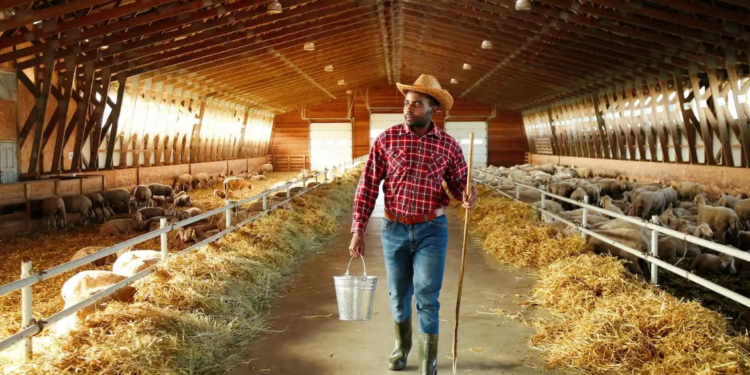March 12, 2025 Story by: Editor
In 1997, Black farmers filed a lawsuit against the U.S. Department of Agriculture (USDA), alleging discriminatory practices that led to widespread land loss, farm closures, and foreclosures.
The National Black Farmers Association (NBFA), founded by John Boyd Jr., played a crucial role in leading this legal effort. A consent decree identified 22,363 Black farmers who had faced discrimination. The initial settlement, valued at $1.06 billion, provided cash relief, tax payments, and debt relief, making it one of the largest civil rights class-action settlements in U.S. history.
In 2010, President Barack Obama signed a law allocating an additional $1.15 billion to compensate farmers who were left out of the original settlement.
The history and challenges of Black farmers are deeply connected to systemic economic, social, and political marginalization in the U.S. Currently, Black farmers account for less than 2% of all U.S. farmers, a significant shift from the early 20th century.
Between 1910 and 1920, Black farm ownership and operation reached its peak, with states like Georgia, Alabama, and Mississippi witnessing a surge in Black farmers. In 1910, the number of Black farmers in the Deep South reached 212,972, supported by Black-owned banks, businesses, and a more competitive agricultural environment.
However, the onset of World War I triggered a decline, as many Black families left farming for manufacturing jobs in the North and sought to escape racial violence. Census data indicates a dramatic drop in Black farm ownership from 41.4 million acres in 1920 to just 5.3 million acres across 32,700 farms in 2022.
Despite this decline, the Southern U.S. remains home to a significant number of Black farmers, particularly in Alabama, Georgia, Louisiana, Mississippi, and South Carolina. Census data also suggests a slight increase in Black-owned farms since 1997, though challenges persist.
Black communities in the U.S. have long been linked to agriculture, tracing back to slavery and the plantation economy. Enslaved Black people provided the labor that fueled the country’s agricultural boom, particularly in cotton and sugar production, which became the backbone of the U.S. economy in the 18th and 19th centuries.
After slavery ended, 3.9 million formerly enslaved Black Americans were denied land grants, despite promises of “40 acres and a mule” under General Sherman’s Field Order 15 (1865).
This order allocated 400,000 acres of confiscated Confederate land to freed Black families, though the promise was later rescinded. Meanwhile, many white Southerners received 160 acres under post-Civil War land distribution policies. Some Black communities experienced brief periods of economic and social mobility during Reconstruction, but these gains were often erased by racial violence, including the 1917 East St. Louis massacre and the 1921 Tulsa Race Massacre, which destroyed the prosperous “Black Wall Street.”
For decades, sharecropping, share-renting, and cash-renting systems kept many Black farmers tied to the land under exploitative conditions. Sharecropping, in particular, has been described by some historians as a form of feudalism that sought to “immobilize free labor for at least nine months to guarantee harvest.” White landowners leveraged debt, restrictive laws, and violence to maintain control over Black farm workers, further limiting their economic independence. Without institutional protections at the local, state, or federal levels, Black farmers’ labor and contributions were historically devalued.
In 1946, scholar and activist W.E.B. Du Bois outlined a vision for economic justice and land reform, stating: “There is a chance for a new cooperative agriculture on renewed land owned by the State with capital furnished by the State, mechanized and coordinated with city life. There is a chance for strong, virile Trade Unions without race discrimination, with high wage, closed shop, and decent conditions of work, to beat back and hold in check the swarm of landlords, monopolists, and profiteers who are today sucking the blood out of this land.” — W.E.B. Du Bois, “Behold the Land,” 1946
The 1997 lawsuit Pigford v. Glickman exposed systemic discrimination within the USDA. The lawsuit detailed how Black farmers were frequently denied loans, debt restructuring, and other crucial assistance, which white farmers received.
It also documented the USDA’s failure to investigate complaints of racial bias. These discriminatory practices resulted in significant land loss and financial hardship for Black farmers, forcing many out of agriculture. More than 61,000 individuals filed claims under the Pigford settlement, and Congress later extended the statute of limitations to allow more affected farmers to seek compensation. The Socially Disadvantaged Farmers and Ranchers Policy Research Center has since worked with the USDA to identify ongoing barriers to racial equity.
While the Pigford settlements acknowledged past discrimination, many Black farmers argue that they did not receive full justice or financial restoration. However, the case brought national attention to the history of racial discrimination in agriculture. Since the Pigford I decision in 1999 and the Pigford II decision in 2011, legislative measures have been introduced to address these issues.
The future of Black farming depends on advocacy organizations like the NBFA, which continue to push for economic justice and equitable policies. Understanding the extent of Black land loss is essential to closing the wealth gap between Black and white farming communities and promoting social mobility for Black landowners. John Boyd Jr. and the NBFA remain committed to advocating for Black farmers who were excluded from previous settlements and ensuring that they receive the same opportunities and support as their white counterparts.
Boyd recently shared his strategy for civil rights, racial justice, and equity for Black farmers with Rashawn Ray at the Brookings Institution on February 20, 2025.
Source: Brookings
















